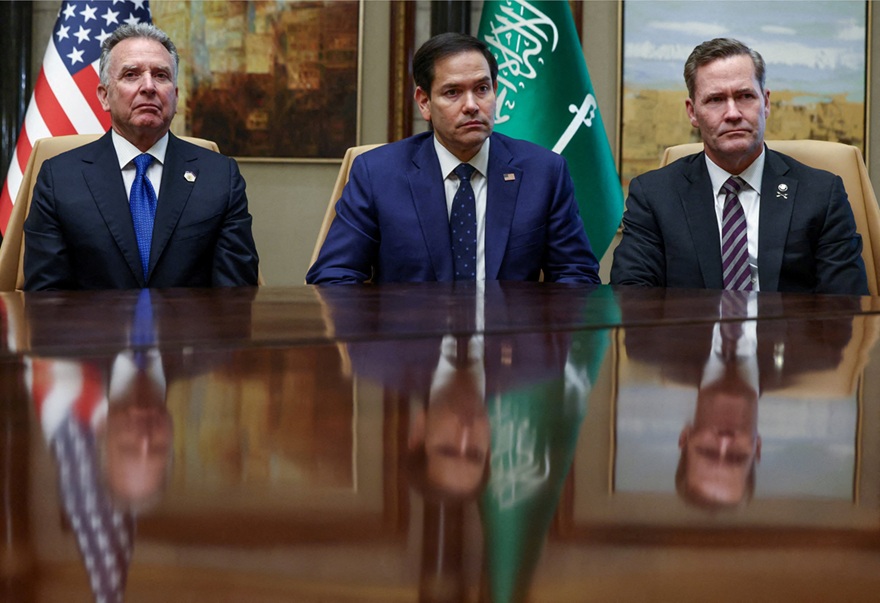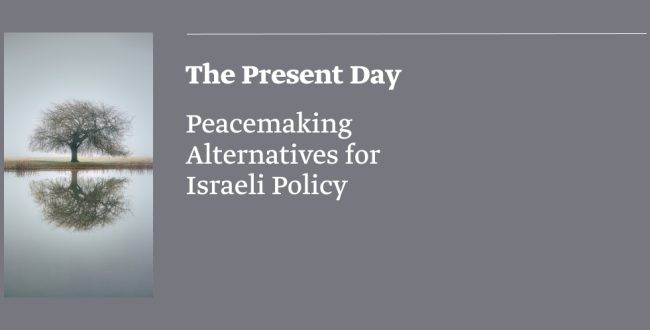In recent weeks, an interview with Trump’s special envoy to the Middle East, Steve Witkoff, made a modest splash among American pundits and local commentators. Between the dubious venue and Witkoff’s obligatory praise for his boss, the conversation conveyed a message hinting at a political shift.
When Tucker Carlson says, “This thing could blow up tomorrow, because we don’t know what the Israeli plan is”, Witkoff replies: “I believe we have to get to a place where people can live a better life in Gaza, and we need to have a plan for that […] It also involves these people’s aspirations — what is going to happen for their children, like our children.” But, he adds, Gazans “don’t have these opportunities for their families.”
Carlson then notes, “A lot of people have been killed in Gaza — a lot of kids,” and raises concerns that the images from there could ultimately contribute to the collapse of the regimes in Jordan and Egypt. Witkoff responds that regime stability is a “huge factor” and praises “King Abdullah of Jordan [for] doing an amazing job figuring out how to deal with this instability.” As for Hamas, they need to become “a whole lot more reasonable.”
Remarkably, not once in the entire interview does Witkoff use the words “Palestinians” or “Palestine”, nor does he offer a coherent political framework that addresses their sovereignty or national rights. Instead, he refers to “Gazans,” as if they were a completely separate entity.
And yet, between the lines, a subtle but significant message emerges: Arab needs and aspirations — however vaguely defined — are being weighed alongside Israel’s. This near-flattening of the Israeli higher moral ground is almost unprecedented in American political discourse.
The Blinken–Remnick conversation reflects the emotional investment of American liberals who care too much about Israel — too much to stop it from spiralling into self-destruction
Compare that to the exit interview former Secretary of State Antony Blinken gave to David Remnick in January 2025. Unlike Witkoff, Blinken uses the word “Palestinians,” reaffirming the U.S.’s traditional commitment to a two-state solution: “There is an opportunity to move forward on normalization” with Saudi Arabia, he says, “but for that, there needs to be a credible pathway to a Palestinian state.”
However, the conversation quickly pivots toward abstract questions of morality, the nature of Israeli society, and even body language analysis — how Netanyahu “sits up, leans forward, leans in,” when Blinken discusses normalization, as opposed to his reluctant body language when a Palestinian state is mentioned.
In the end, Blinken declares: “Israeli society will have to choose. They’ll have to decide on the path they’re ready to travel to normalization. We can’t answer that question for them.” With minor edits, these could be the words of a liberal Israeli, situated somewhere between Meretz and Yair Lapid.
Isolationism means indifference — not just toward Arabs, but toward Israel as well
For all of Blinken’s polished diplomacy, it is no coincidence that Witkoff’s more impromptu message ends up sounding more promising to Arab ears. Witkoff does not propose justice for the Palestinians, nor stability for the region; it is also far from hegemonic within Trump’s circles. What it does illustrate is how deeply previous Democratic administrations were entangled in the internal Israeli drama — as if Israel were an extension of their own political and moral identity.
The Blinken–Remnick conversation reflects the emotional investment of American liberals who care too much about Israel — too much to stop it from spiralling into self-destruction. Witkoff on the other hand proposes a sense of detachment, a glimpse of what happens when America simply starts caring less about both sides.
Isolationism means indifference — not just toward Arabs, but toward Israel as well. For the Arabs, this means business as usual. For Israelis, it means a tectonic shift.
Two Competing Middle Eastern Agendas
It is too early to claim Witkoff’s discourse represents a fundamental shift in U.S. foreign policy. But it is not insignificant in the current negotiations over Gaza’s future. In a recent Hebrew column, our academic director Assaf David places Witkoff’s interview within the broader context of regional Arab regimes attempting to broker a political solution for Gaza.
David points towards two trajectories that are now unfolding across the region, each exerting pressure on the American administration. The first is led by the United Arab Emirates. Sheikh Tahnoun bin Zayed, the UAE’s national security adviser, recently visited Washington, shortly before the UAE announced a staggering $1.4 trillion investment in U.S. infrastructure over the next decade.
Concurrently, the UAE’s ruler, Mohammed bin Zayed, travelled to Cairo, where according to some sources he pressured Egyptian President Abdel Fattah al-Sisi to accept 500-700,000 Palestinians from northern Gaza in exchange for continued American aid. If Egypt refuses, that aid could be diverted to the resettlement of these Gazans elsewhere, and Egypt could face sanctions through international financial institutions.
The Egyptian plan is the only Arab plan on the table that addresses Palestinian rights and demands, which are at the root of the conflict
The land that would remain for Palestinians in Gaza lies south of the so-called Netzarim corridor, closer to the Egyptian border. A similar coercive arrangement with Jordan is reportedly on the table. While the UAE pays the mandatory lip service for a Palestinian state, its true priorities are conveyed by its photo-ops with leaders of Israel’s settlement movement.
The second trajectory is led by Egypt, which has recently launched a detailed initiative: it calls on Hamas to disarm, offers a blueprint for Gaza’s reconstruction, and lays out a path toward a two-state solution.
This plan is far more mainstream from an Arab point of view, and surprisingly close to Witkoff’s vague suggestions to Carlson. Witkoff even hints he is being pressured not to support it, but toe the Emirati line. Crucially, the Egyptian plan is the only Arab plan on the table that addresses Palestinian rights and demands, which are at the root of the conflict.
If it fails, we should expect the continuation of ethnic cleansing in the West Bank and Israeli atrocities in Gaza.

The Collapse Factor: Lessons from Assad
One factor looming over all these maneuvers is the potential for regime collapse. The decapitating of Hezbollah’s leadership, that was the domino brick that gave the final push to Bashar al-Assad in Syria, is celebrated in the West and Israel as a meaningful blow to the Iranian axis.
This is certainly true from a purely military point of view. Hezbollah and Assad as an Iranian insurance policy against an American-Israeli attack is now bankrupt. Yet, as we argued in our Hebrew newsletter, Assad’s downfall is paradigmatic, as it reveals the region’s profound instability.
The fundamental lesson to be learned from Assad’s fall is its abruptness. This lesson is certainly not lost on rulers all over the region: A-Sisi, Abdullah, Mahmoud Abbas and others. If the Israeli military campaign in Gaza continues, when eyes of the young Arab generation watching in real time, the likelihood of a further unravelling of the political order in the region will rise.
The denial of Palestinian independence is not only unjust — it also cannot produce any stable political reality
The Present Day: No Plan, No Peace
The Egyptian plan — with tacit support from the Witkoff faction in the White House — underscores the glaring lack of any Israeli political plan. Recently, the Forum for Regional Thinking has published a policy paper titled “The Present Day: Peacemaking Alternatives for Israeli Policy.”
The title pushes back against the vague discourse around “the day after” — a hypothetical future moment when some sort of settlement will somehow come to pass. In contrast, our policy paper describes a reality in which Israel, with the backing of its allies, continues to avoid political solutions while advancing the destruction of Palestinian society and the region as a whole.
Our paper provides both an analytical survey of the misconceptions that have led to October 7 and a deeper historical critique. We argue that although ours is a conflict of regional dimensions, its root cause remains the clash between Zionist settlement and Palestinian resistance. The denial of Palestinian independence is not only unjust — it also cannot produce any stable political reality.
To stabilize this impossible situation, extreme measures are required. Netanyahu believed he could maintain control by “managing” the conflict indefinitely — a belief rooted in Israel’s technological superiority and divide-and-rule tactics against the Palestinians. The Qatari-funded bolstering of Hamas, at Netanyahu’s behest, was essentially a bribe: it allowed him to avoid both a full-scale war and genuine peace for nearly a decade — until the illusion was shattered.
Supporting Israel today should mean demanding that it respect international law, uphold Palestinian rights, and withdraw from occupied territories
On the regional level, we provide a historical review showing that since the 1970s, Arab regimes and societies have generally been ready for reconciliation with Israel, provided there would be a just solution for the Palestinians. The opportunity was real. Its rejection by Israel is what has brought us to this historical nadir.
When writing in English for an international readership, it is especially important to emphasize the role of the international community — particularly countries and societies that consider themselves either allied or identified with Israel, most notably in the United States and Europe.
Israel is ultimately a creation that could not have materialized or survive in a state of constant conflict without massive external support. However, at this point, when Israel’s own strength now threatens its future more than anything else, Western responsibility for its survival cannot be captured by the notion of “unconditional support”.
On the contrary, supporting Israel today should mean demanding that it respect international law, uphold Palestinian rights, and withdraw from occupied territories in Syria, Lebanon, Gaza, and the West Bank.
These expectations are the crucial missing element in the Witkoff-Trump vision for the region. The Trumpian worldview — incoherent as it may be — says something like this: let the Arabs and Jews sort it out themselves. Meanwhile, the Biden (and broadly European) approach has meant unconditional support for Israel. As different as these worldviews are, neither will produce reconciliation, let alone stability, not to mention peace.


















